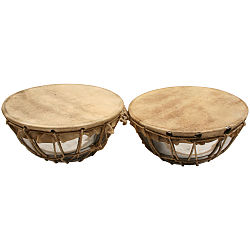Gosha naghara

Iraqi Naqqarat
|
|
| Other names | Naqqārat, "naqqare, nakkare,nagora,نقاره |
|---|---|
| Classification | |
| More articles | |
The naqqāra, nagara or nagada is a Middle Eastern drum with a rounded back and a hide head, usually played in pairs. It is thus a membranophone of the kettle drum variety.
The term naqqāra (نقاره), also نقارات naqqarat, naqqarah, naqqåre, nakkare, nagora comes from the Arabic verb naqr- that means "to strike, beat".
The instrument was also adopted in Europe following the Crusades, and known as the naccaire or naker.
The rounded section of a naqqara is made of baked clay, while the flat side consists of treated skin fastened around the rim with string which is tightened over the back of the bowl.
This percussion instrument is often played in pairs, where one naqqara will produce low pitch beats called nar and the other for the high pitch beats. The instruments are beaten with short wooden sticks bent outward at the upper ends called damka.
Naqqārāt is the name of kettledrums in Arabic countries. Naqqārāt, hemispherical with the skin stretched over the top, come in pairs. Naqqarat is one of the percussion instruments used in Maqam al-Iraqi chalghi ensembles. Under the late Abbasids and the Fatimid Caliphate, kettledrums were beaten before the five daily prayers; small ones form part of present-day orchestral ensembles.
Naqqåre can be found in different sizes in different regions of Iran:
Naqqara are also found in India, where the word is pronounced nagara or nagada. They are paired kettledrums traditionally used in the naubat "Nine Things", a traditional ensemble of nine instruments. Nagara are also played with sticks. Today, this instrument is usually used to accompany the shehnai or "Indian oboe", an indispensable component of any North Indian wedding.
Rebecca Stewart's unpublished thesis, The Tabla in Perspective (UCLA, 1974) has suggested tabla was most likely a hybrid resulting from experiments with existing drums such as pakhawaj, dholak, and naqqara.
In Azerbaijan there is a kind of kettledrum that is called ghosha-naqara. Ghosha means "pair".
In Turkey, this word is pronounced nakkare and refers to small kettledrums beaten with the hands or two sticks. Kös, or giant kettledrums played on horseback, are a separate instrument. These drums and the davul or cylindrical drum were used in Ottoman mehter music.
...
Wikipedia
